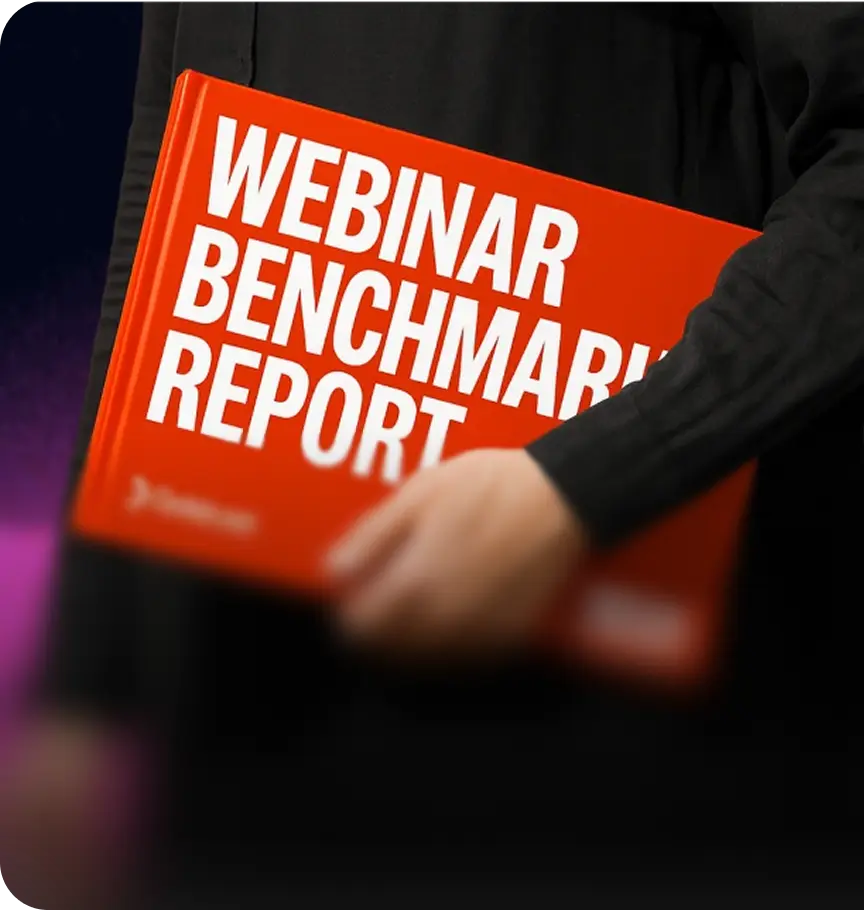Event Series: Not Just For Marketers! Here's How To Get Other Departments Involved

Table of Contents
Maximize Your Marketing ROI
Join 10,000 other marketers already getting the best tips on running engaging events that boost pipeline and create raving fans.
In our first installment of our Series Masterclass, all about how to create, launch, and grow an ongoing event series, we discussed why you need to do a series and how you can make the biggest splash possible with your serialized content.
Next, Lindsay McGuire, Goldcast's Associate Director of Content and Campaigns, continued the conversation, inviting these experts to the stage:
- Jessica Haas, VP Customer Experience, Chief of Staff to the CEO, Appcues
- James Buckley, Guest Speaker, Host & Sales Content Creator, The Sell Better Daily Sales Show
- Nicola Plate, B2B Marketing Campaigns Manager, Expansion, 1Password
As you can see, these roles extend outside of the standard marketing function. For example, Jessica spends most of her time thinking about customer experience, as well as how to internally connect with employees. James, on the other hand, hosts a daily (yes, daily!) show about sales, and Nicola works with current customers to expand their accounts and provide ongoing value.
While it's a common myth that marketing has to be the department in charge of a series—whether an event, podcast, or another type—it makes more sense for everyone to join in on representing the brand and creating strong content.
Read on to find out:
- The value of an ongoing series
- How other teams can get involved with serialized content
- Keys to success: Creating a series with staying power
- How to partner with other departments for a successful series
- Event series frequently asked questions (FAQs)
If you want to follow along as we talk through the biggest takeaways, you can watch the full episode below!
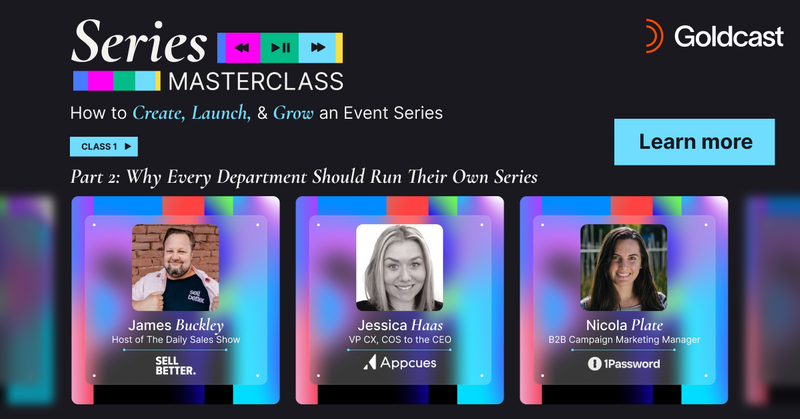
The value of an ongoing series
First, let's talk about why each of these experts leaned into hosting a series.
1Password's Tiny Tutorials
At 1Password, Nicola runs Tiny Tutorials, which is focused on existing customers. The goal is to scale 1Password's onboarding efforts and provide more value without putting a ton of work on the onboarding team. A series is the perfect choice because it's repeatable, scalable, and helps customers adopt the platform.
"People buy a piece of software for 20% of what it can actually do. It's up to the company to do things like series that help people really fall in love with the product and not be able to let it go." - James Buckley, Guest Speaker, Host & Sales Content Creator, Sell Better Daily Sales Show
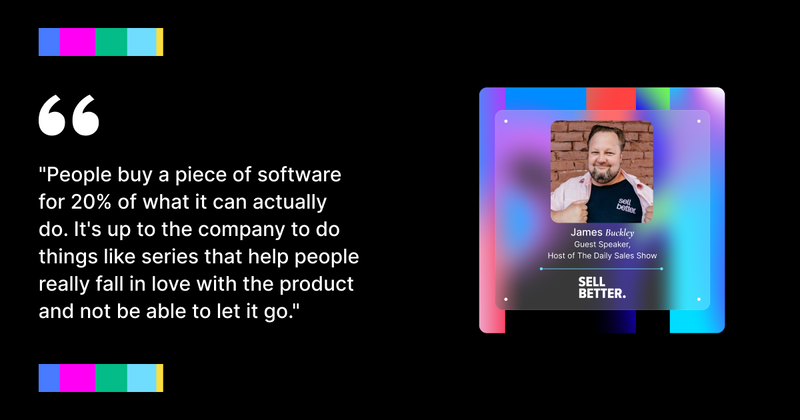
ROI/Revenue impact: While a direct line to revenue can be difficult to track, 1Password looks instead at marketing influenced revenue. If the team can see that within a certain timeframe, a customer took an action and revenue increased, they attribute that in part to the series. In its lifetime, Tiny Tutorials has influenced ~200K in revenue!
The Sell Better Daily Sales Show
James began hosting a series as a natural progression from monthly webinars. Thousands of people were signing up and engaging in the Q&A, and his team realized there was a big opportunity to step up the volume, build community, and attract target buyers.
They ramped up to two shows a week and then decided to try a daily show, which many people thought was impossible—yet hundreds of people still show up, and James's pipeline is full.
The series allows James and his team to keep conversations going and stay in touch with prospects. By hosting a daily show, he's already proven his value and his expertise; he becomes someone people look to for help, which is exactly what a salesperson wants to be.
ROI/Revenue impact: Curated invites and follow-up play a big role in the success of James's series; he looks at his series as a "catalyst for conversation and context." Not every episode will be a hit for every person, but that's by design. From there, the team analyzes response rates and the impact on opportunities.
"Something I've learned running Donuts and Demand is that every episode is not going to resonate with every single person on your list. As long as you're tracking and growing over time, generally speaking, it's okay." - Lindsay McGuire, Associate Director of Content and Campaigns, Goldcast
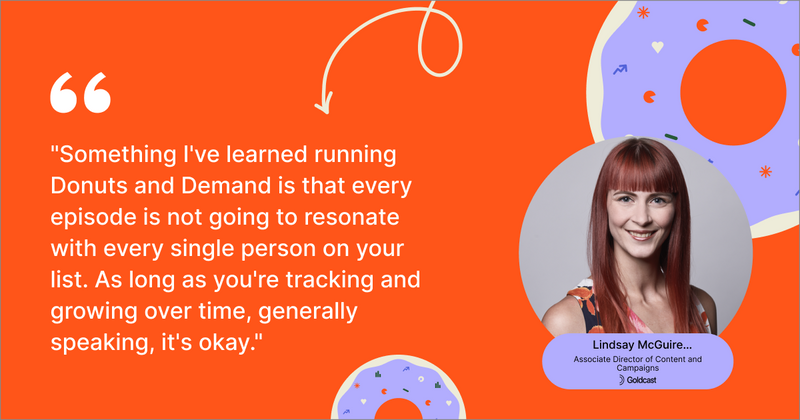
PS: If you need help creating some of your follow-up assets, check out our Content Lab, an AI-powered tool that helps you repurpose your event content in just minutes! All the videos in this post were clipped using Content Lab.
Appcues' three ongoing series
Jessica's company runs three ongoing series, one of them with the audience being the company's own employees with the focus on sharing customer stories. Once a month, the CEO will bring on a customer and ask targeted questions to draw out meaningful answers that speak directly to employees.
The goal is to humanize customer feedback and get to the heart of the matter through authentic conversations. Not only do employees get to hear from actual customers, but the customer also feels appreciated by Appcues because they get direct time with the CEO in front of the entire company.
"There's this immeasurable human element to it that has impact on revenue. It's invaluable." - Jessica Haas, VP Customer Experience, Chief of Staff to the CEO, Appcues
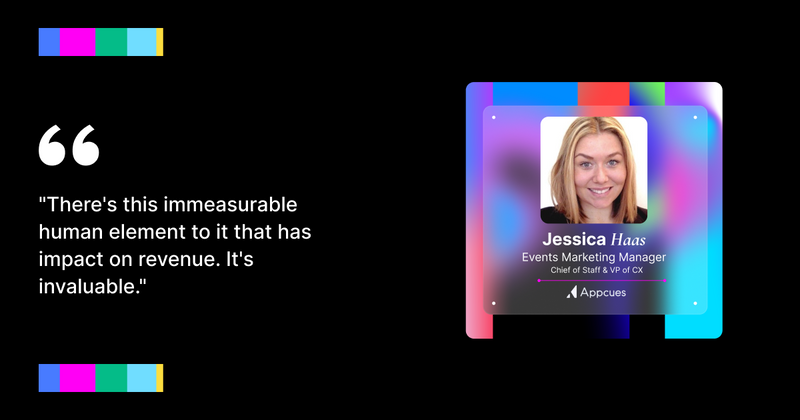
ROI/Revenue impact: As a result of the series, dots start to be connected in real ways. The GTM teams are able to hear feedback directly from the customer, which validates feedback from other sources and increases urgency. Meanwhile, the product team is able to think about building and engineering based around what customers want.
How other teams can get involved with serialized content
Now let's talk about the main topic: What are some ways that other departments can get involved with an ongoing series?
"That's what every department should be considering in the modern sales age: What can I create that will attract and magnetize people to me so that I can then connect, converse, and uncover opportunities? And that is literally the flow." - James Buckley, Guest Speaker, Host & Sales Content Creator, Sell Better Daily Sales Show
CX and internal teams
Because Jessica's series target internal employees, she needs to know the questions they want asked. Finding out what different teams need to know in order to improve in their own jobs is essential to hosting a successful series. She also encourages those teams to ask questions at the live events to get clarity or more information from customers.
As a rule, Jessica points out that CX professionals love to be involved and want to help out. By the nature of the job they do, they're inclined to want to be helpful. And they have a wealth of information on what your customers want and need, so it makes sense to include them as much as possible!
Product teams
At 1Password, one of the main partners for the Tiny Tutorials series is the product specialist team. They got involved not only because they have that deep product knowledge, but because they wanted to develop new skills and participating in the series allowed them to do that.
It's important to lean on people who have the expertise you might be missing when it comes to a series. As a marketer, you probably don't have all the info on product use cases and technical knowledge that your product team has. Nicola also works with the onboarding, marketing, and product marketing teams to learn about customer questions, product updates, and more.
It's also worth noting that you should be open to ideas and suggestions. Tiny Tutorials actually was born from a suggestion from someone on the onboarding team, and it's grown to be a really helpful resource for all departments!

Keys to success: Creating a series with staying power
Here are just a few of the keys to success for running an ongoing series our speakers shared.
Have a process, but keep it flexible
As the host of the longest running daily sales show, James cites process and teamwork as the dominant drivers of his success. He recommends partnering with people you can lean on and collaborate with, and to get comfortable being uncomfortable.
This means you'll also need to be flexible. While James has a list of static questions for his show, everything might change during the prep call if it makes sense for the guest, audience, and topic. His concern is always promoting an organic, authentic conversation and if that means things have to change, he's okay with that.
"Strict process, teamwork, and an ability to be flexible baked into the process is going to make things so freaking easy for you that this becomes second nature. And once that happens, it's unconscious competence. You just do it." - James Buckley, Guest Speaker, Host & Sales Content Creator, Sell Better Daily Sales Show
Identify the right team and tools needed
When it comes to teamwork, remember to leverage everyone's unique strengths. No one's going to be able to run a series by themselves; it's impossible. You need to find people you can trust!
Nicola knows what she can do well, and she's comfortable calling on others to do the things that she can't. For example, she works with people that she knows she can rely on to do more of the logistical work while she focuses on the organizational pieces.
Also, think about how you can use AI to lighten your lift. We pointed out that Content Lab can help you repurpose your content within just minutes, as opposed to the weeks it can sometimes take to manually go through your event content. There are so many tools out there, no matter what your need is!
"There are real ways AI can help you with your organization and automation, even for organizing your guests and audience." - Jessica Haas, VP Customer Experience, Chief of Staff to the CEO, Appcues
Continually evaluate your content
And finally, build in time to reflect. Check in once a quarter or every six months and evaluate your efforts. Loop in other departments and get their feedback. What's working? What's not? What could be different? What would you do differently if you started this whole thing over tomorrow, from scratch?
Making sure that you continuously take a step back and look at things from a big-picture perspective will help you avoid "sitting in your comfortability too much," as Jessica put it.
Partner with other departments for a successful series
As you can see, a strong event series relies on the expertise of so many departments, from product to customer success and, of course, marketing. We hope you'll keep this in mind as you develop your own serialized content.
Don't forget to catch up on the full conversation below and let us know what you think!

Event series frequently asked questions (FAQs)
Here's just a sprinkling of some of the event series frequently asked questions (FAQs) that came up during the Q&A time at the event.
Q: Getting eyeballs on webinars is a difficult task. On-demand seems to be more popular, but it misses the live interaction angle. Any advice?
A: First, search for your first-degree connections and send them invites and DMs, if the content is relevant to them. Targeting people you're already connected to is easy, low-hanging fruit! You could even leverage LinkedIn InMails to reach out to second- or third-degree connections who might be interested.
You can also highlight the things someone could only get from attending the live show. For example, if you push out the content and all of the assets and resources in a follow-up email, what reason does someone have to attend? If, on the other hand, there's a giveaway or some exclusive asset they can only get by showing up, they're more likely to attend. (A big reason why we love giveaways here at Goldcast!)
Be sure to promote the event anywhere your customers hang out, whether that's on your website, in your app, or in your newsletter. You want them to know something of value to them is being offered, without feeling like you're throwing it in their face.
Q: How do you get customers to come and present for your series?
A: Be sure to have solid, ongoing relationships with your customers so they're already "warm" for the asking. Then, pitch them on the event! Be sure that your invite and info sheets are branded and professional looking and make your customer feel special.
Give them all the info they need, from the type of questions that will be covered to the amount of time you'll want from them. You want your customers to feel like they're saying yes to something that's run really well and not just slapped together, so they feel more comfortable agreeing to give their time.
Q: How do you motivate other departments to be involved with your series, especially in a very busy company?
A: A few tips here!
- Be sure you're providing something of value to the people participating, whether that's gaining a new skill, being more visible in the company, or something else
- Ask employees for feedback. Make sure they feel like their opinions and ideas matter and are heard.
- Realize that this isn't for everyone, and not all employees will participate. That's okay!
Transform Your Video Marketing with AI
Stay In Touch
Platform
Resources
Company
© 2026 Copyright Goldcast, Inc. All rights reserved.
YOUR PRIVACY CHOICES


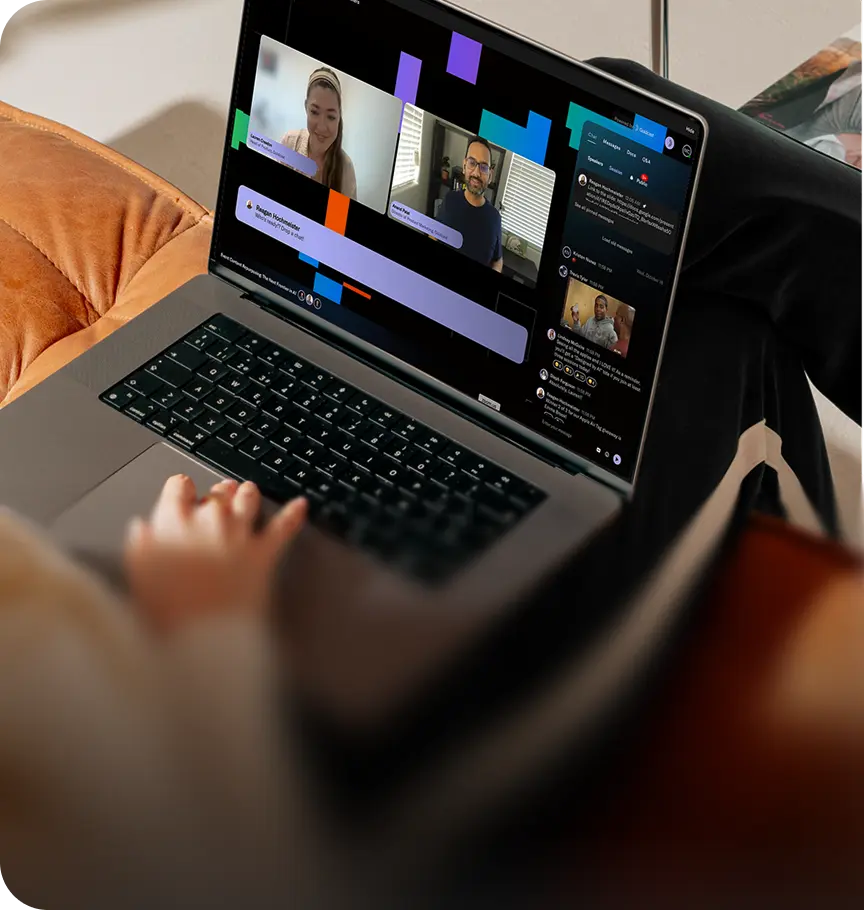

 Upcoming Events
Upcoming Events Event Series
Event Series On-Demand Events
On-Demand Events